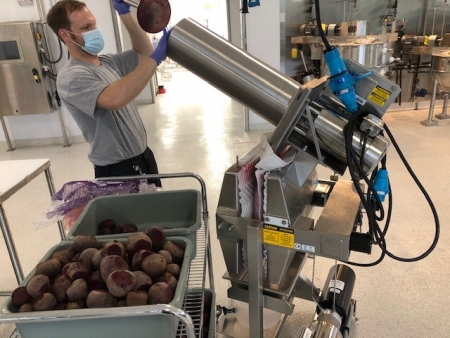NCFIL Executive Director’s Perspective: October 2020

“Just because it’s taking longer doesn’t mean that you will never reach your goal – Patience is key.”
NCFIL Status
October has been a month of ups and downs for the NC Food Innovation Lab. We were moving nicely toward being fully operational, but just could not quite make that goal by month’s end. Electricians tried their best to get us there, but there were several toe stubs along the way. Some parts of our facility were fully operational this month, and as we narrow down the list of equipment to be installed and commissioned, the excitement level keeps rising.
NCFIL Activity: Products Being Produced…
We produced several plant-based products during October in both the Pilot Plant and Product Development Lab. The hallways around NCFIL have been filled with the aromas of grape juice, sweet potato pie, peanut butter granola, bananas, caramel, smokey molasses and teriyaki marinades, and blueberry essence. In the last two weeks, we’ve signed additional agreements that will keep us busy until the end of the calendar year.
The photos posted throughout the blog demonstrate NCFIL’s recent activity:
- Pilot Plant Manager Joseph Hildebrand juices beets for a customer.
- Blue oyster mushrooms are tumbled under vacuum to make jerky; NCFIL reduced the process time from 60 hours to 6 hours, using emerging technology.
- NCFIL bottled over 1,200 bottles of grape juice and placebo for a large, multi-year clinical trial being conducted at a major medical center.
- NC State University Food, Bioprocessing, and Nutrition Sciences students filled ice cream toppings as a fundraiser for the Food Science Club. Please visit www.NCSUFSC.com/store to purchase these products and help the Club fundraise.
Consumers Consider Healthy Holiday Eating
The COVID pandemic has encouraged consumers to re-evaluate their eating styles and to consume healthier foods. Consumers have actively sought out foods that stimulate the immune system. With the holidays upon us, consumers are asking many nutritionists, food scientists, and medical professionals which holiday foods are beneficial and won’t destroy newly-established healthy eating patterns during this festive time of the year.
Of course, many people are aware that plant-based foods are healthier, but like all foods, it is easy to overindulge in some of these food types and experience negative consequences, especially gastrointestinal distress. Most consumers made smart changes, and many now follow flexitarian diets. A flexitarian diet is rich in plant-based foods, particularly fruits and vegetables, yet minimizes, but does not eliminate, animal-based foods.
Several major plant-based meat analogue manufacturers have launched products that have gained attention in the mass media, but from a nutritional perspective, some of these products are not particularly healthy. As consumers make holiday dinner choices, they should review the nutritional label on meat analogues.
Holiday Dinners: Stimulate Immunity? Reduce Inflammation? Yes!
Traditional holiday dinners are rich sources of foods that can stimulate the immune response and also reduce inflammation. For example, the traditional Thanksgiving dinner is rich in highly nutritional foods like carrots, cranberries, green beans, Brussels sprouts, sweet potatoes, greens, squash (including pumpkin) and white potatoes. Even turkey, in moderation, is a nutritionally rich source of the amino acid arginine, which the body uses for protein synthesis. Arginine also promotes the relaxing and opening of blood arteries.
Nearly all of the mentioned vegetables are rich in Vitamins A, C, and K, important antioxidants that contribute to a healthy cardiovascular and immune system. Folate, found in green beans, is especially important for women of child-bearing age as studies link this nutrient to reducing the risk of neural tube defects, such as spina bifida and anencephaly in infants. Cranberries contain polyphenols that are powerful antioxidants, and carrots, greens, pumpkin and sweet potatoes are rich in carotenoids, which can improve cardiovascular function and may be important in lowering cancer risk.
Get Your Vitamin D: Eat Mushrooms? Yes!
A recently published research article examining hospitalized COVID patients found that more than 80% were vitamin D deficient. Vitamin D can be elevated by diet and subsequent exposure to sunlight. The only plant-based source of vitamin D is mushrooms.
Many people do not especially like mushrooms, but in addition to their vitamin D content, they are also high in polyphenols, the B vitamins (riboflavin, niacin, and pantothenic acid), potassium and fiber. So, when you prepare gravy this holiday, add some finely diced mushrooms to the recipe and promote health to your loved ones. Salmon or trout served as an appetizer or main course is another option for adding vitamin D to the holiday feast.
Of course, cooks can easily negatively impact the positive nutritional benefits of plant-based foods by over-processing or adding rich butter or cream sauces. Moderation is the key for all diets. We should enjoy the holidays, but be conscious about food preparation and intake.
One last thought, red wines are also a rich source of anthocyanins, like resveratrol, which are powerful antioxidants. Consumed in moderation, wine can have positive health benefits for cardiovascular health, diabetes, certain types of cancer and atherosclerosis.
To the Holidays and Health
Here’s to starting the 2020 holiday season! Hopefully, next year will not be as challenging as this one.
Thank you for reading this month’s perspective. These are the views and opinions of the NCFIL Executive Director and may not reflect the opinion of others at NC State University. We welcome your feedback and perspectives.
Plant-based food innovation for healthier foods is a very active area in the food industry, so let’s talk about how NCFIL can collaborate with you to produce future generations of immune-enhancing and healthier foods.
- Categories: